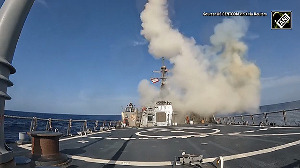While Obama's visit to India has a strategic and economic dimension, what the visit portends for the US's relations with China is a big question, says strategic expert B Raman.
The forthcoming visit of President Barack Obama to India, Indonesia, Japan and South Korea will be as important as his earlier swing through the Asia-Pacific region after assuming office in January 2009. His first swing was in November last year when he visited Japan, Singapore, China and South Korea.
Japan and South Korea figure in both swings, indicating the importance attached by him to the US' relations with its two military allies in Asia. Highlighting the US' solidarity with these two countries and its security commitments to them have been an important hallmark of his Asia-Pacific policy.
One has again seen this recently in the joint exercises held by the US navy with the South Korean navy despite Chinese concerns in the wake of the alleged sinking of a South Korean naval ship by North Korea and in the reiteration by US Secretary of State Hillary Clinton during her current swing across the Asia-Pacific region that the US security commitments to Japan covered the Senkaku group of islands in the East China Sea too. While the US wished for a peaceful resolution of the dispute between Japan and China, its security commitments to Japan will continue to cover these islands too so long as there is no definitive settlement between Japan and China on the question of sovereignty over the islands.
In addition to Japan and South Korea, his Asia-Pacific focus has been on China, India and Indonesia in that order. The reasons for the priority given to China in his Asia-Pacific policy have been economic as well as military -- the impact of China's rise as an economic power on the US economy and the impact of China's rise as a military power on peace and security in the Asia-Pacific region and on the freedom of navigation in the waters of the area.
Economic issues such as the alleged Chinese manipulation of the value of its currency in order to maintain its exports to the US to the detriment of the US manufacturing sector and the alleged Chinese use of its monopoly in the production of rare earths as a political weapon against countries such as Japan are increasingly figuring in the diplomatic discourse between the US and China.
China-related issues with military implications such as the increasing assertiveness of the Chinese navy, the modernisation of its armed forces and Beijing's repeated emphasis on its 'core interests' even if they are at the expense of the 'mutual interests' of the countries of the region have led to two consequences.
Firstly, a US determination to maintain the primacy of its navy in the Asia-Pacific region and secondly, its increasing interest in bilateral issues involving China and the countries of the region such as China's disputes with Japan and some ASEAN countries, particularly Vietnam, on the question of sovereignty over the islands in the East and South China Sea.
Obama's enhanced interest in India has economic as well as military origin. Economically, while the Indian manufacturing sector poses no threat to the US manufacturing sector similar to the threat posed by the Chinese manufacturing sector, India's services sector, particularly its lead in the information technology sector, is casting, in his view, a lengthening shadow on the US job market.
Hence, his unyielding pressure against outsourcing to India to the detriment of the unemployed in the US. Obama's inability to deal effectively with the US economy has been an important contributing factor to the decline in his popularity and to the set-back by his party in the mid-term elections to the US Congress.
It could come in the way of his own chances of re-election as President. Obama's economic pressure against both China -- on the question of its manipulated currency -- and India on the issue of outsourcing would continue at least till the next presidential elections. Neither China nor India can expect any gestures from him on economic issues.
The military origin of his enhanced interest in India arises from the huge Indian market for military equipment. An increase in the US sales of military equipment to India will have three benefits for the US: an increase in jobs in the US, enhanced US political influence on Indian policy-making and a check on China's power aspirations in the region.
The pressure on India to buy more military equipment from the US will continue to be an important component of the US policy towards India. Continuing restrictions on the sale of military-related equipment to China and a gradual relaxation of the existing curbs in relation to India are to be expected in the months to come.
A major enunciation of the US policy towards the Asia-Pacific region came in one of Obama's speeches in Japan during his first swing in November, 2009. He said: "There must be no doubt. As America's first Pacific President, I promise you that this Pacific nation will strengthen and sustain our leadership in this vitally important part of the world."
He described himself as the USA's first Pacific President because of his birth in Hawaii, his living in Indonesia as a boy and his mother spending nearly a decade working in the villages of Southeast Asia. He added: "The Pacific rim has helped shape my view of the world."
In his enunciation of what will be his policy in the Asia-Pacific region, he said: "Since taking office, I have worked to renew American leadership and pursue a new era of engagement with the world based on mutual interests and mutual respect. And our efforts in the Asia Pacific will be rooted, in no small measure, through an enduring and revitalised alliance between the United States and Japan."
Explaining why he decided to start his first swing from Japan, he said that he was beginning his journey there in part because of "our common values -- a belief in the democratic right of free people to choose their own leaders and realise their own dreams; a belief that made possible the election of both Prime Minister Yukio Hatoyama and myself on the promise of change."
He had a message for China too. "The United States does not seek to contain China, nor does a deeper relationship with China mean a weakening of our bilateral alliances. On the contrary, the rise of a strong, prosperous China can be a source of strength for the community of nations. And so in Beijing and beyond, we will work to deepen our strategic and economic dialogue, and improve communication between our militaries. We will not agree on every issue, and the United States will never waver in speaking up for the fundamental values that we hold dear -- and that includes respect for the religion and cultures of all people. Because support for human rights and human dignity is ingrained in America. But we can move these discussions forward in a spirit of partnership rather than rancour."
Chinese analysts looked upon his first swing across the region, the subsequent swings of Clinton and other US policy-makers and the increasing US interest in its relations with the ASEAN and its member-countries as "the return of the US to Asia" -- to underline that it was determined to maintain its political and military primacy in this region and not to concede it to China.
While the Chinese have the confidence that China can compete against the US economically, they do not have the confidence that it can compete against it ideologically, politically and militarily.
After having seen the increased articulation of the US interests in this region after his first swing, they are watching nervously what the second swing will portend for China and its big power ambitions. It is significant that just as Obama chose Japan, a democracy, for the start of his first swing, he has chosen India, another democracy, for the start of his second swing.
Just as he emphasised the US' ideological compatibility with Japan in his address in Tokyo, the spotlight during his visit to India will be on the US' ideological compatibility with India.
What would this mean in terms of the US' relations with India and China? That is the question to which Chinese analysts are trying to find an answer. They are still confused.












 © 2025
© 2025